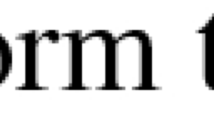Abstract
This tutorial will present an overview of the use of Monadic Second-Order Logic to describe sets of finite graphs and graph transformations, in relation with the notions of tree-width and clique-width. It will review applications to the construction of algorithms, to Graph Theory and to the extension to graphs of Formal Language Theory concepts.
Supported by the GRAAL project of “Agence Nationale pour la Recherche”.
Preview
Unable to display preview. Download preview PDF.
Similar content being viewed by others
References
Courcelle, B.: The expression of graph properties and graph transformations in monadic second-order logic. In: Rozenberg, G. (ed.) Handbook of Graph Grammars and Computing by Graph Transformations. Foundations, vol. 1, pp. 313–400. World Scientific, Singapore (1997)
Courcelle, B.: Graph structure and monadic second-order logic. In: Book in preparation. Cambridge University Press, Cambridge (2009), http://www.labri.fr/perso/courcell/ActSci.html
Courcelle, B., Mosbah, M.: Monadic second-order evaluations on tree-decomposable graphs. Theor. Comput. Sci. 109, 49–82 (1993)
Downey, R., Fellows, M.: Parameterized Complexity. Springer, Heidelberg (1999)
Flum, J., Grohe, M.: Parameterized Complexity Theory. Springer, Heidelberg (2006)
Courcelle, B., Makowsky, J., Rotics, U.: Linear time solvable optimization problems on graphs of bounded clique-width. Theory Comput. Syst. 33, 125–150 (2000)
Makowsky, J.: Algorithmic uses of the feferman-vaught theorem. Ann. Pure Appl. Logic 126, 159–213 (2004)
Author information
Authors and Affiliations
Editor information
Editors and Affiliations
Rights and permissions
Copyright information
© 2009 Springer-Verlag Berlin Heidelberg
About this paper
Cite this paper
Courcelle, B. (2009). Monadic Second-Order Logic for Graphs: Algorithmic and Language Theoretical Applications. In: Dediu, A.H., Ionescu, A.M., Martín-Vide, C. (eds) Language and Automata Theory and Applications. LATA 2009. Lecture Notes in Computer Science, vol 5457. Springer, Berlin, Heidelberg. https://doi.org/10.1007/978-3-642-00982-2_2
Download citation
DOI: https://doi.org/10.1007/978-3-642-00982-2_2
Publisher Name: Springer, Berlin, Heidelberg
Print ISBN: 978-3-642-00981-5
Online ISBN: 978-3-642-00982-2
eBook Packages: Computer ScienceComputer Science (R0)




